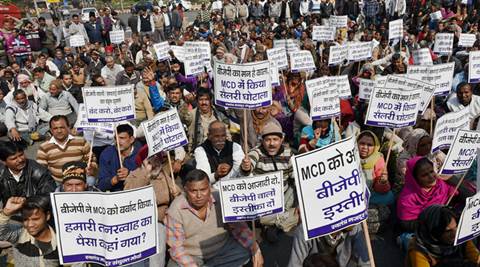
The Municipal Corporation of Delhi (MCD) is not the first municipality in India to run out of funds to pay salaries to its staff. This is merely the latest in a series of growing municipal upheavals that India has witnessed in the past decade. Our cities are growing rapidly but the quality of life they offer is steadily deteriorating. State governments, who are the primary owners of our cities, have consistently neglected institutional reforms (read policy response) in cities and municipalities, and instead over-emphasised select sectoral project — somewhat analogous to curing multiple organ failure through band-aids. This lack of initiative on systemic reforms in our cities is mani-
festing itself time and again in the form of municipal crises.
Delhi’s case has underscored the significance of reforms in financial management of municipalities. The 4,041 cities in India have a population of over 400 million but the revenues of their municipalities are far from adequate. Further, there is no assurance on whether these funds meet the desired outcomes. Therefore, states need to put in place a roadmap for financial self-sufficiency and financial accountability in municipalities.
Concurrent policy measures are required to ensure that a municipality’s medium-term financial position is sound. In municipalities, only short-term cash flows are measured and managed, and not balance sheets. A state legislation on fiscal responsibility and budget management in municipalities is, therefore, long overdue. Enacting this would protect the financial sustainability of municipalities. States themselves will gain from such a move if they make, at least a part of, the state grants conditional on the adherence of the medium-term fiscal plan. A good beginning would be to mandate audit of annual accounts by empanelled chartered accountants, as is the case in banks and PSUs.
All of the above need to be circumscribed by an effective policy on transparency, accountability and citizen participation. The public disclosure law under the Jawaharlal Nehru National Urban Renewal Mission was a good beginning in this regard. But it needs to be strengthened further through the addition of built-in incentives and disincentives, as well as the incorporation of open data standards. Greater disclosures will nudge citizens to take ownership of their city.
Lastly, there is an acute shortage of skilled staff in the finance and revenue departments of municipalities. This is a key reason for poor tax collections and weak financial management. A combination of solutions, including skill certifications and outsourcing of collections, etc, would be highly effective.
These are realistic and feasible policy solutions which can make our municipalities financially sustainable. Other states need to learn lessons from Delhi’s crisis and show leadership in municipal financial reforms.